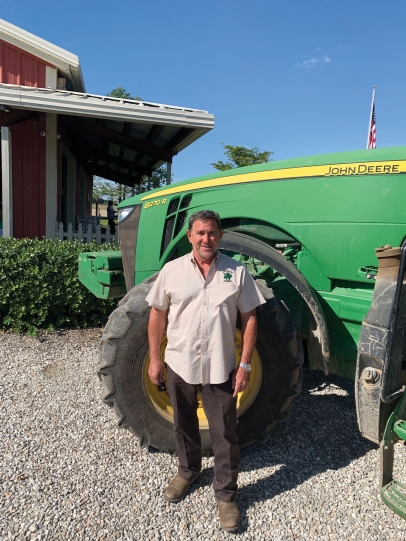Sam S. Accursio & Sons

AT A GLANCE:
Sam S. Accursio and Sons
Farmers: Sam S. Accursio and his family Where they’re located: Seasonal farmstand: 16790 SW 177 Ave.
Website: Accursio Farms
What they grow: Green beans, squash, zucchini, pickling cucumbers, okra. Their seasonal farmstand sells local Homestead tomatoes, eggplant and sweet corn.
Where they sell: Their farmstand during the winter-spring growing season
CSA: No
The Accursio name is well known in the Homestead farming community, dating back to 1948 when Sam S. Accursio and his family moved from Boston to Florida City to set up his farm on five acres. The senior Accursio, who died in 1995, was known as the Pickle King for his success in growing pickling cucumbers sold to major pickle companies like Vlasic, Heinz and Roddenberry. Today, the farm is a 2,000-acre project run by his son, Sam, and his own sons, Sam III and Austin. Accursio has adapted deftly to a changing world. When restaurants closed and supply chains were disrupted by the pandemic at the height of the growing season, he started selling directly to consumers, who lined up at daybreak at his drive-through for boxes of tomatoes and other vegetables. To attract people to his Krome Avenue farmstand, he brought in a food truck and entertainment. Especially impressive are his social media videos that reveal not just the daily life of the farmer from the fields to the packinghouse, but also the complex issues faced by South Florida farmers.
WHAT THEY GROW: Green bean (snap beans), squash, zucchini, which we refer to as squash – green and yellow, pickling cucumbers, which we refer to as pickles (very confusing), and okra. The other highly sought-after commodities we carry in our market are Homestead tomatoes, grown by Kern Carpenter and sweet corn grown by John Alger – both of these Homestead farmers are childhood friends and “brothers” to me. We also carry Homestead-grown eggplant provided by Sam’s actual brother-in-law. This year we have Georgia pecans grown by my cousin. It’s def a family business!
THEIR APPROACH TOWARD SUSTAINABLE FARMING: Farmers are the original protectors of the land. Good farmers nurture the land. We work closely with the University of Florida experimenting with ways to protect the land and increase quality yields. For the first time in many years, we planted cover crop to grow during our summer down time, and so far we are seeing the earth produce far superior results in terms of yields. Sometimes you look at the expenses involved in continuing to farm during the down time, and in a year that you may have lost money, you might decide against cover crop. This year we were able to do it and the results are good.
BIG CHALLENGE THIS YEAR: Thirty years ago Homestead had housing that was specifically used for migratory labor. That housing blew away with Hurricane Andrew and like the Homestead Air Force base, was not really replaced. Increasingly complex building regulations in the county prevent the construction of affordable housing for those harvesting crops. The affordable housing that is available for agriculture labor in the area is taken up by those working in the nursery industry, which operates year-round, not seasonally. The housing of migratory labor continues to be a challenge not faced in any other county in Florida except Miami-Dade.
ON HIGHER PRICES FOR PRODUCE: Consumers may experience rising prices for produce along the same lines as other consumables. However, this does not reflect a higher price for the farmer’s crop. Today, there are only two commodities where American farmers produce more than the United States imports: beans and strawberries. All other commodities in the produce department are imported from another country more than they are grown locally. For example, in one week the United States consumes 28M pounds of squash. Only 3.7M pounds are produced in America (Florida). The remaining 24M pounds are imported, driving down the price. This imbalance is how we lose industry in America. The only reason Accursio Farms is still in business is because we have partnered with some great chains and distributors that are aware of the challenges faced by American farmers, and they are fighting for local growers – and also because of the growing awareness of our surrounding community. When the pandemic first hit and supply chains shut down, the community responded in the wee hours of the morning not just by buying local, but they waited in long lines to do it! Their response demonstrated all that is good in a community – we made friends, we sold produce, we provided produce, we exchanged good vibes – what a beautiful thing it was in the middle of a disturbing event!




